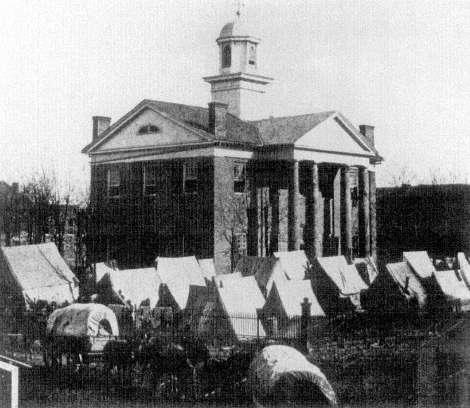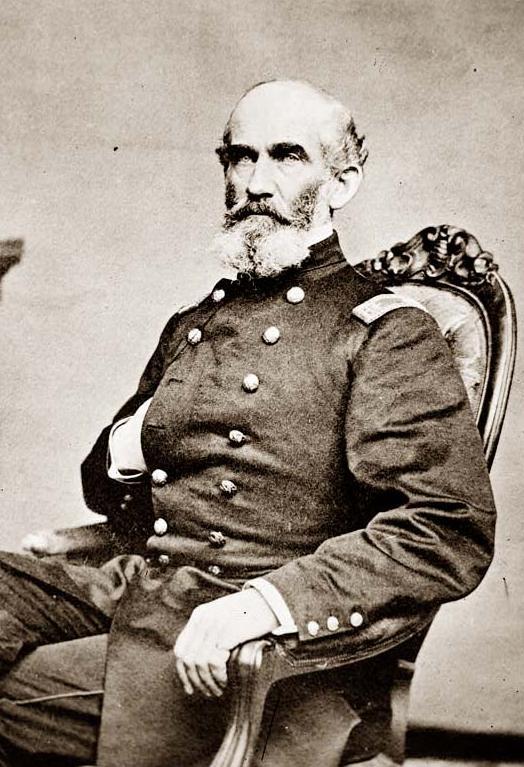Contributors
Top Stories of 2017: Historian Looks Back at Oxford During Civil War


Original Courthouse during 1862 occupation. Notice Yankee tents and wagons
Starke Miller, a local historian who specializes in the Civil War, reintroduces a chapter of Oxford history that over time has “gone with the wind.” Steve Vassallo sat down with Miller to learn more about the Oxford Square during the time of the Civil War.
HottyToddy.com: Starke, is it true that Grant arrived here in December 1862 with 50,000 troops, or is this our imagination?
Starke Miller: Grant came to Oxford on December 4 and 5 with 50,000 men. Another 30,000 were stationed at College Hill.
HottyToddy.com: What was his objective?
Starke Miller: Grant thought he was going down the Mississippi Central Railroad to take Jackson, and then he was going to Vicksburg. He was going to use the railroad for his supply line.
HottyToddy.com: You once told me that if the railroad into Oxford had not been completed in 1859, the war would have never crossed our path in Lafayette County.
Starke Miller: The railroad brought overnight mail and same- or next-day newspapers. It cut travel time from days to hours. It even brought fresh oysters to Oxford. But it also brought the Yankees and all their destruction.
HottyToddy.com: Confederate General Earl Van Dorn somewhat threw a monkey wrench into Grant’s plans. How did this impact Oxford?
Starke Miller: Van Dorn raided Grant’s supply depot at Holly Springs. Grant realized he could never fully protect the rail line or his supplies behind him. He realized he had to go down the Mississippi River to get to Vicksburg. He knew the Confederates could not tear up or burn the river like they could the railroad.
HottyToddy.com: In 1863 more cavalry was passing through Oxford. Which army had control over the town at that time?
Starke Miller: A few thousand Union Cavalry passed through Oxford one day that summer on their way to wreck the railroad engines, cars, shops and the round house at Grenada. It probably took them at least three hours to pass through Oxford. They would have gone into most of the stores on the Square and bought, or stolen, whatever they wanted. There also would have been some harassment of citizens.

1864 Union sketch of the burning of Oxford. Yes, that is a Doctor’s office skeleton a Union Cavalryman had on his horse.
HottyToddy.com: Fast-forward to 1864. Union General A.J. “Whiskey” Smith was intent on burning the town and Ole Miss. Did he succeed?

General Andrew Jackson Smith
Starke Miller: Smith had burned Ripley one month before, and in the same manner, he burned Oxford. He was chasing Nathan Bedford Forrest both times. Forrest had left here two days before and had raided Memphis. Out of anger, I believe, Smith ordered the town of Oxford and the University of Mississippi burned.
HottyToddy.com: Some individuals believe Oxford was burned in retaliation for the destruction of Chambersburg, Penn. by Confederate troops. Is there any truth to this theory?
Starke Miller: That did happen just before the Yankees came to Oxford. There is a story that the Yankees in Oxford learned of that burning from a Southern newspaper they found in Oxford. But I have an account of a messenger riding up to A.J. Smith, as he sat on his horse on the north side of the Square, with the news Forrest had slipped around him to the West and that he had raided Memphis the night before. That is when Smith ordered the town and University burned. I believe it was purely anger. There was no military need for it.
HottyToddy.com: Who was Jacob Thompson, and why was his mansion significant to Oxford?
Starke Miller: Jacob Thompson was probably the wealthiest man in Oxford, with the largest, finest furnished house in town. He had been a member of President Buchanan’s cabinet before the war. He was a member of Jeff Davis’ government during the war. His fine mansion, with its furniture, nearly all imported from Europe, was burned by A.J. Smith the same day the town was burned in 1864.
HottyToddy.com: Was Thompson truly a Southern spy, or is this simply a fabrication orchestrated by abolitionists?
Starke Miller: After the Union Dahlgren raid on Richmond, when it was discovered the Raiders had one of their objectives to kill Jefferson Davis, the Southern gloves came off. Southerners hatched a plan to kidnap Lincoln, and Jacob Thompson was sent to Canada with a large amount of gold to finance a number of Confederate schemes against the North.
HottyToddy.com: Confederate General Nathan Bedford Forrest was in and out of Oxford a lot. Why so?
Starke Miller: From January to August of 1864, Forrest used Oxford for his headquarters.
HottyToddy.com: Describe the Oxford Square in 1861.
Starke Miller: Very similar to today in layout. Probably at least half the buildings were wood. The courthouse was a bit smaller. One very interesting thing I figured out, from the census, was that right at 40% of the business owners and clerks were foreign-born. In walking into the stores, you would have heard a lot of different accents.

August 1864 ~ The ruins of Oxford after Union General “Whiskey” Smith burned the town. The white columned building is Cumberland Presbyterian Church. Photo from Jack Case Wilson’s, “Faulkners, Fortunes and Flames”
HottyToddy.com: Did the Yankees declare martial law in Oxford?
Starke Miller: Whenever the Yankees were in town overnight, they would impose a dusk-to-dawn curfew on the townspeople. They did not want pot shots taken at them in the dark and also just for their general security.
HottyToddy.com: Looking to 1865, what transpired in postwar Oxford? Wasn’t a certain German immigrant a major player in rebuilding the Square?
Starke Miller: Hermann Wholleben was a 27-year-old blacksmith in Oxford before the war. He joined the 1st Mississippi Cavalry, and he participated in Earl Van Dorn’s raid on Holly Springs in 1862. Instead of grabbing a new saddle or a repeating rifle or a nice Yankee overcoat or simply getting drunk, he went to the paymaster’s office and grabbed a sheaf of uncut Yankee $20 bills. After the war, he bought about half the Square and was a very wealthy man. Faulkner used this story in one of his books. Will Lewis (owner of Neilson’s) and I believe it also.

Plaque on a building on the Square
HottyToddy.com: One individual, Alfred H. Kendal, who is buried in St. Peter’s, was an unsung hero for Oxford and Lafayette County at age 14. Few of us know who he is and why he is important.
Starke Miller: When the Courthouse was set on fire by Smith’s men in 1864, Alfred Kendal took a wagon up to the door, and he saved most of the marriage, probate and land records out of the courthouse. He was a brave young man.
Starke Miller, a Civil War historian and expert on the University Greys, conducts tours of Oxford, Ole Miss, and St. Peter’s Cemetery.
 Steve Vassallo is a HottyToddy.com contributor. Steve writes on Ole Miss athletics, Oxford business, politics and other subjects. He is an Ole Miss grad and former radio announcer for the basketball team. Currently, Steve is a highly successful leader in the real estate business who lives in Oxford with his wife Rosie. You can contact Steve at sovassallo@gmail.com or call him at 985-852-7745.
Steve Vassallo is a HottyToddy.com contributor. Steve writes on Ole Miss athletics, Oxford business, politics and other subjects. He is an Ole Miss grad and former radio announcer for the basketball team. Currently, Steve is a highly successful leader in the real estate business who lives in Oxford with his wife Rosie. You can contact Steve at sovassallo@gmail.com or call him at 985-852-7745.
Follow HottyToddy.com on Instagram, Twitter and Snapchat @hottytoddynews. Like its Facebook page: If You Love Oxford and Ole Miss…





























